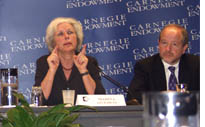Registration
You will receive an email confirming your registration.
Thursday, January 23, 2003
IMGXYZ267IMGZYXSpeakers:
Marina Ottaway: Senior Associate, Carnegie Endowment and author of Democracy Challenged: The Rise of Semi-Authoritarianism
Richard Joseph: Reagan-Fascell Democracy Fellow at the National Endowment for Democracy
Patrick Merloe: Senior Associate and Director of Programs on Election and Political Processes at the National Democratic Institute
Moderator:
Thomas Carothers: Senior Associate, Carnegie Endowment
Listen to audio of remarks by Tom Carothers.
Listen to audio of remarks by Marina Ottaway.
Listen to audio of remarks by Richard Joseph.
Listen to audio of remarks by Pat Merloe.
Listen to audio of question and answer period.
Introduction to Democracy Challenged
Tom Carothers introduced the participants and Marina Ottaway's new book Democracy Challenged: The Rise of Semi-Authoritarianism. This study of five countries-Croatia, Azerbaijan, Egypt, Senegal and Venezuela-investigates semi-authoritarian regimes as a type of political system that is distinct from democracy and authoritarianism and also does not represent merely a transitional stage between the two.
Marina Ottaway began the discussion by noting that 118 nations had been invited to the International Conference on Democracy, reflecting the huge upsurge in the number of nations that now hold some form of multi-party elections. Unfortunately, in many of these nations democratic change has amounted to little more than the adoption of formal institutions and some opening of political space. The core of the government's power still remains beyond popular challenge. Democracy does not seem to be arriving by a slow process or consolidating, it seems to be stopped.
Ottaway argued that two factors allow nations to exist as semi-authoritarian states: games played by incumbent regimes and structural conditions. Structural conditions common to all the states she studied were polarization (along either ethnic or socio-economic lines); problems of state formation, each of which encouraged the population to view the incumbent regime as a guarantor of stability; and most importantly the shallowness of earlier transitions to democracy. She noted that the pro-democracy elite in many of these countries has not built a significant constituency or effectively mobilized the population around the issue of democracy. Too often, democracy has been an abstract concept without policy content or, worse, has been associated with unpopular policies dictated by the West, such as extreme economic liberalism.
In light of these structural factors, Ottaway suggested that democracy aid must change in several ways. It may seek to selectively engage with groups and organizations that have significant domestic constituencies. Aid providers must work to re-establish links between policy and politics, helping parties create meaningful and differentiated policy platforms. And political institutions must be deepened, with special attention given to helping legislative bodies play a real role in addressing policy issues. Donors could help parliaments play a more important role if they insisted that all aid programs be discussed in the parliament, rather than simply with officials of the executive agencies. Ottaway acknowledged that such steps entail risks and will complicate the aid relationship, but insisted that they are crucial to encouraging change in countries with semi-authoritarian regimes.
Panel Discussion
Richard Joseph noted that many commentators have been increasingly concerned with "hybrid," "gray-zone," and "authoritarian with adjectives" regimes as they seek to explain the mixed success of the wave of democratic transitions that took place in the early 1990s. The label "semi-authoritarianism" is a useful category only if it identifies common characteristics of these countries that are more salient than the differences among them. He questioned whether that was the case. Joseph also argued that elite sponsored democracy movements can play an important role in building democracy and felt that Ottaway downplayed the dangers of the sectarian, extremist and nationalist groups that may enjoy wide constituencies but may also threaten the stability of the nation.Pat Merloe also felt that Ottaway's characterization of these nations and the democracy programs working in them was overly pessimistic. He agreed with Ottaway in noting the large number of nations that lie between one-party or military states and democracy, the importance of social and economic factors in determining attitudes to democracy and government, and the often superficial connections between democratic elites and their society. However, Merloe questioned how static these nations truly are, pointing out that in Peru, for example, a semi-authoritarian trend had reversed itself. He also stated that building links to civil society and democratic reformers must remain at the core of democracy aid. To do otherwise would demoralize the democratic opposition and send a tacit signal of acceptance to the semi-authoritarian regime.
Synopsis prepared by Bethany Lacina, Junior Fellow with the Democracy and R ule of Law Project at the Carnegie Endowment.
